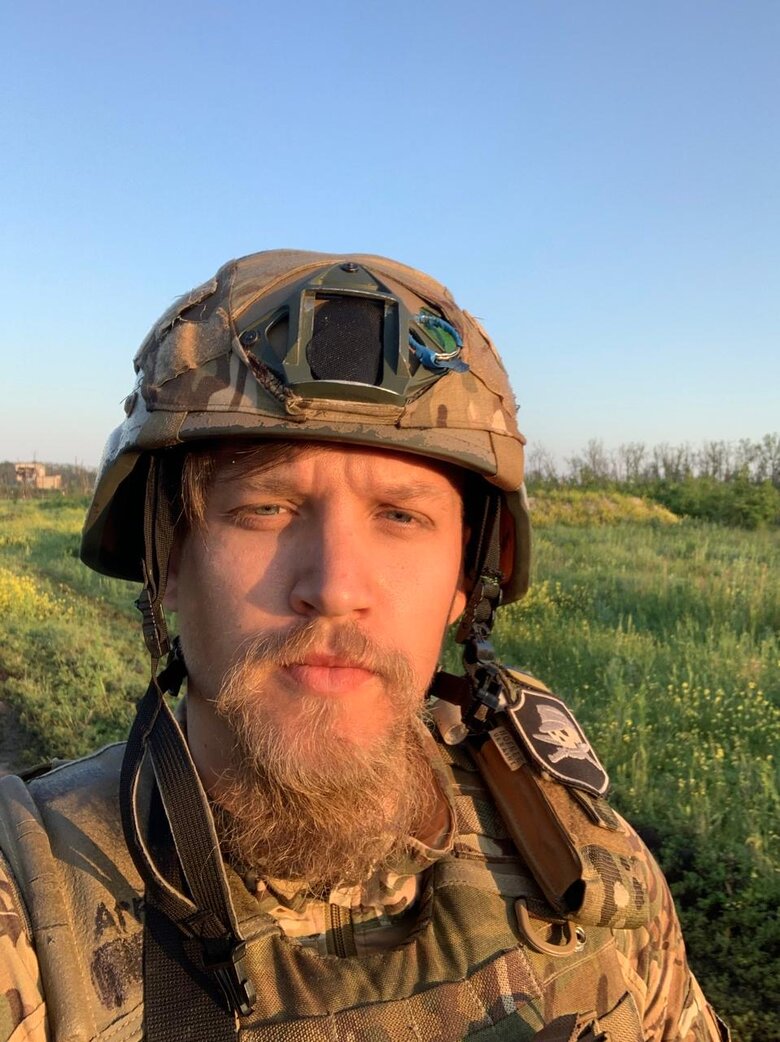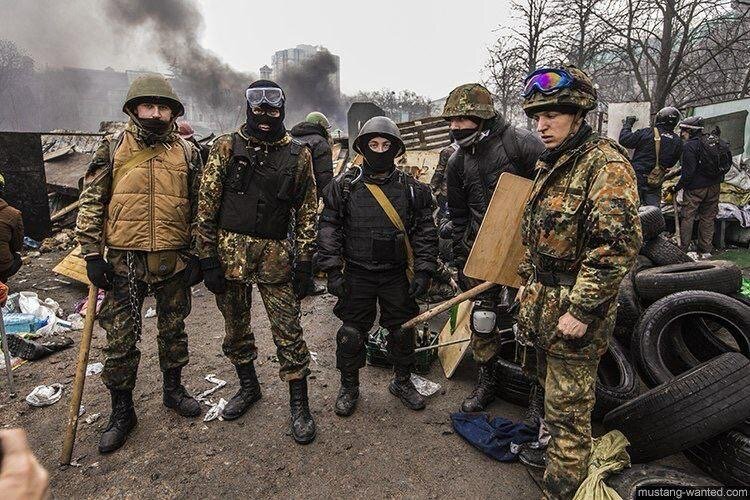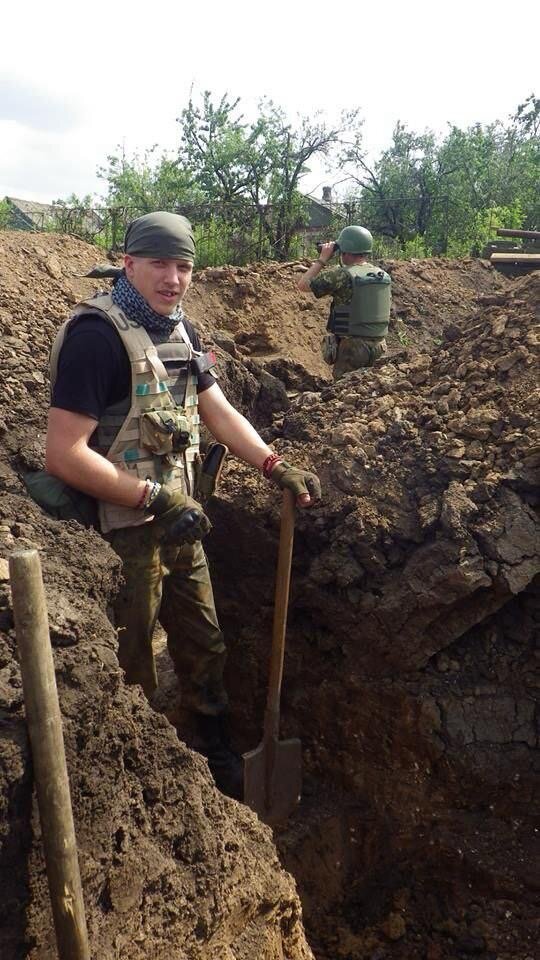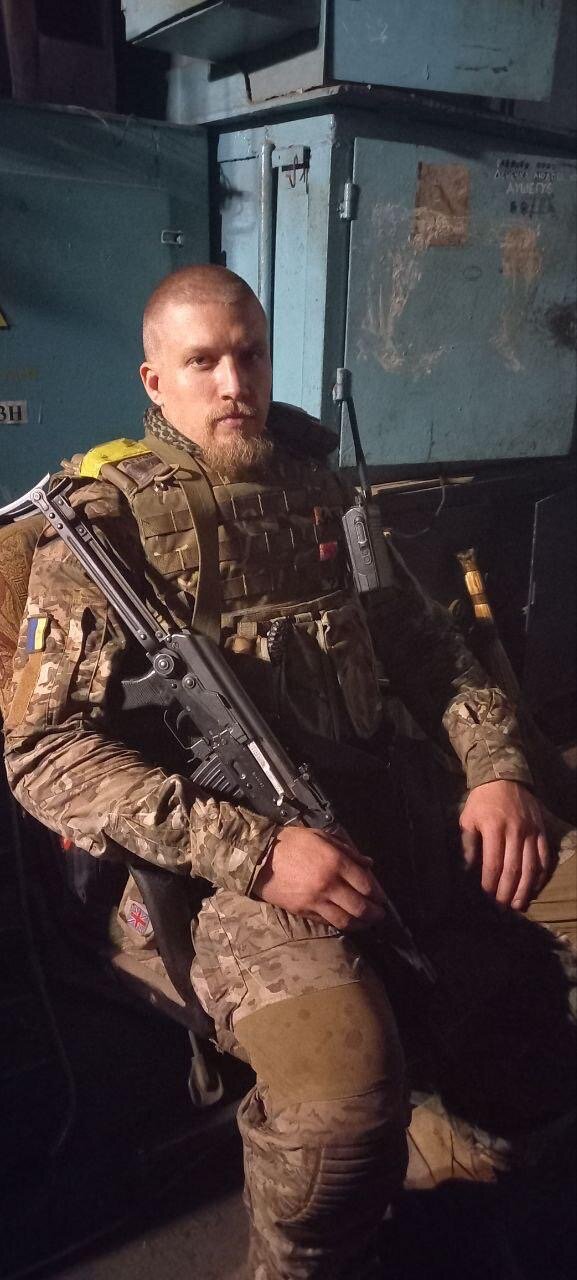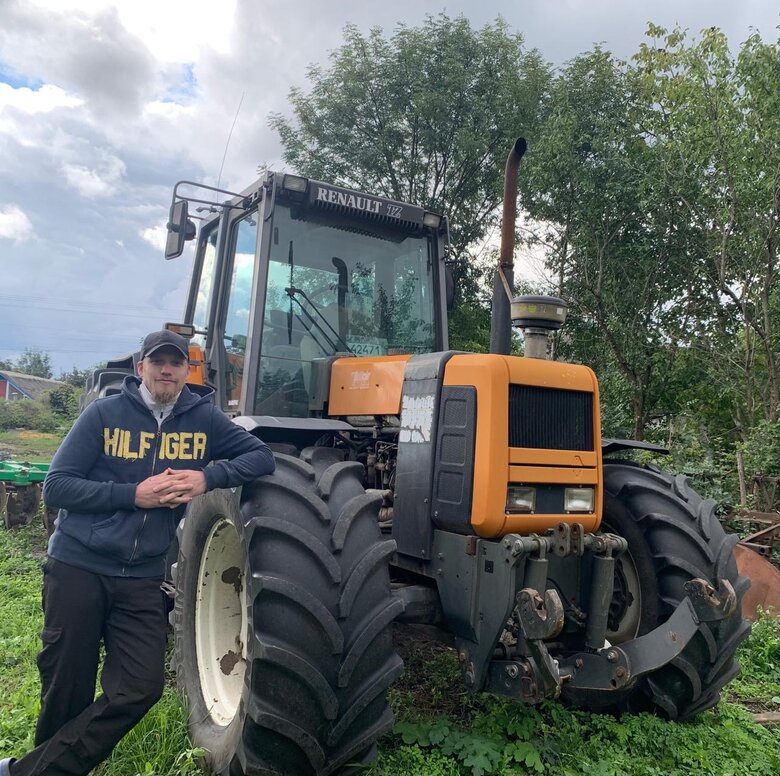Call sign Ahronom: "If we had any serious reinforcement, for example, with peacekeepers, Russia could find itself in extremely unfavorable position"
Serhii has been fighting in Donbas for nearly three years. He commands a company of unmanned systems within the 5th Separate Assault Brigade, whose soldiers operate ground-based drones. His call sign is "Ahronom" (Agronomist), a call sign he received back in 2015 when he took part in the Anti-Terrorist Operation (ATO) as a member of the volunteer unit Carpathian Sich. At the time, he was a student at Podil State University, where he was studying agronomy.
- Why did you decide to go to war in 2015?
- I grew up with a patriotic worldview. I was a member of a nationalist organization. I took part in civic activities. I spent my time with like-minded young people who dreamed of seeing truly Ukrainian leadership in Ukraine — who wanted it, believed in it, and prepared for it. We went on hikes, played sports, and organized educational events and public actions, including commemorations of historic anniversaries. In 2014, some People`s Deputy called us neo-fascists. I remember very well how we organized a march in Kamianets-Podilskyi to mark Roman Shukhevych’s birthday. Inna Bohoslovska (then a member of parliament from the Party of Regions – O.M.) claimed we were neo-fascists and said we held the event just to scare people. In reality, we simply wanted to honor Ukrainian heroes with dignity. But we stood firmly against people like her — those in power with openly pro-Russian views. We wanted change. That’s how we joined the Revolution of Dignity and became active participants, especially during those turbulent days.
On 20 February, we were on Instytutska Street during the shooting of the Heavenly Hundred. People were being killed just a few meters away from me. I saw bullets hit them in the head. But even then, we kept throwing ourselves into the heart of everything that was happening. Only later did we realize what a serious rollercoaster we'd experienced. Personally, it hit me about a day afterward, when I returned to Instytutska Street. That’s when I had my first experience of PTSD. I understood how many people had been killed. I fell into a deep depression. Soon after, I realized we had to prepare for war — Russia had already invaded Crimea and was advancing into Donbas. It was clear we needed to get involved and continue the fight. At first, I tried to officially join the army — I submitted applications to the Ministry of Internal Affairs battalions that were being formed at the time and went through interviews. But the bureaucracy and delays were wasting my time, so I decided not to wait and in early 2015, I went to war as a volunteer fighter. I fought until August.
- Why only until August?
- I decided to resume my studies. I had to choose — either go back to university or sign a contract with the army. But what really influenced me was the failure to implement the Minsk agreements. The ceasefires started, the bans on returning fire, the constant questioning of who had violated the truce. It was the birthday of Danylo Kasianenko — a guy who joined the Carpathian Sich just a day after I did. He had just turned 19. He was killed by a 120-mm mortar strike during the ceasefire... That really hit me hard. I felt crushed. How could we be getting shelled — and not be allowed to respond?!
- How did you end up in the full-scale war?
- By the way, I had been preparing for it too. Against the backdrop of statements about a possible offensive, my friends and I got together and started running training sessions for civilians in our city (Kamianets-Podilskyi– О.М.). In February, we practiced with mock assault rifles, grenades, and so on. We gave people basic knowledge of how to handle weapons and follow safety protocols — just enough to be able to defend themselves if it came to that.
When the full-scale invasion began, we immediately went to the military enlistment office. But because of the overwhelming number of people, they couldn’t process everyone. We were redirected to the Territorial Defense Forces, which at that point were still just being formed. Since Kamianets-Podilskyi didn’t need defending at the time, my comrades and I decided to head to Kyiv. On February 28, we joined the city’s defense.
- The enemy was advancing rapidly at the time. What were you thinking?
- I understood that the capital had to be held at all costs. It was absolutely crucial. What really inspired me was the huge number of highly motivated volunteer fighters who were going into battle. We were part of the Carpathian Sich unit. It was a very mixed group — some didn’t even have helmets, others had body armor with only one plate, and so on. But we grabbed our RPGs and headed into the grey zone in the Brovary direction to hunt Russian tanks, to stop their equipment that was slowly advancing. When we entered villages where no Ukrainian troops were present, locals helped us, including hunters with rifles. People pointed out enemy vehicles, and we prepared ambushes. We made Molotov cocktails. People were incredibly motivated. No wonder the Russians were forced to retreat — the resistance was truly powerful. It was really cool! At the end of the Kyiv campaign, we were sent to Irpin and Stoianka. People there were so fired up that no one was going to let the enemy cross the river. The Russians suffered massive losses.
- What were the battles like there?
- For me, it felt similar to the ATO, but with more sabotage missions. We tried to take the enemy by surprise. We’d anticipate their movements and set up ambushes. Drones were barely active back then, so we could still move around during the day. The biggest threat was getting caught in artillery fire — they had tons of it. But once you understood how it all worked, you learned how to maneuver.
- How did you end up in the 5th Assault Brigade?
- After the enemy pulled out of the Kyiv region, we were still clearing Stoianka and Stoianka-2. Then our volunteer unit was redeployed to the Izium area. But we already understood the war wasn’t going to end quickly. So we wanted to officially join the Armed Forces. It was difficult to do that within our unit. Then the guys and I found out that the 5th Separate Assault Regiment was being formed. We heard about its potential. So we decided to join it.
- What was your initial role here?
- After enlisting, I took up a position as a driver in a grenade launcher platoon within a fire support company. Less than a month later, the first battalion was deployed to the front lines, and we were sent in as reinforcements. In June 2022, we headed to the Lysychansk direction. Since then, we've been operating in the combat zone. In just a few months, it’ll be three years that we’ve been on the Donbas front. Over time, I became a squad leader in the grenade launcher platoon. As the company expanded and new units were added, the command approached me with an offer to lead one of the newly formed platoons — a machine gun platoon armed with heavy Browning machine guns. I agreed. That’s when I was promoted to chief sergeant and began serving as a platoon commander. We built a team and carried out our missions successfully. In the winter of 2023, we were redeployed to Bakhmut. At first, we continued working with grenade launchers, but by spring, we had switched to machine guns. That same year, an order came down to select soldiers from the machine gun unit to train on a ground-based drone platform equipped with a Browning machine gun. We began working in that direction during the summer. According to the official structure, ours was one of the first units to operate such drones. A few months later, I officially became the commander of that platoon.
- In general, we hear much more about unmanned aerial vehicles. Ground drones get less attention. What are their advantages? What do you personally like about them?
- We hear and know less about ground drones because this field is still developing. We're in the process of gaining experience. Each drone either finds its own niche or pushes us to develop a platform specifically designed to perform a certain task. Overall, ground drones have both advantages and limitations. Compared to aerial systems, ground-based drones can carry out missions that flying drones still can't. These include transporting heavy loads, evacuating the wounded, and operating heavy infantry weapons. Ground drones are also used as kamikaze platforms — both smaller ones, weighing between ten and thirty kilograms delivering an effect comparable to a missile or bomb strike, and larger robotic systems capable of carrying hundreds of kilograms.
The key advantage over aerial drones is that ground drones are unaffected by weather conditions. Wind, rain, snow, or fog — none of it matters. We’re not dependent on the weather.
- Do you primarily use these drones as kamikazes or for transporting cargo?
- Our unit is still small, as we are at the stage of formation, so we cannot boast of any systematic work in many areas. Most often, we use drones armed with machine guns. They are on constant combat duty and perform certain tasks. We also carry out missions to deliver goods or evacuate people on an ad hoc basis.
- What about Russian ground drones? I assume you're keeping an eye on that.
- Yes, we’re monitoring what the enemy is doing. So far, they haven’t used them actively — just isolated incidents. Only now have Russians begun to develop this area to a greater or lesser extent. We may soon see serially produced ground drones coming off their military plants. They already have a number of prototypes — some of them clearly dead ends, but others could pose real problems. Still, I believe we’ll stay ahead of them in production. I’m hopeful our drones will always remain one step ahead.
- Are they stealing our ideas again, like they did with FPV drones?
- Of course — they’ve been stealing and they’ll keep stealing. In war, anything that proves effective gets replicated, both by us and by the enemy. That’s just how it works. Over the past year and a half, we’ve seen the overall potential of unmanned systems grow tremendously. Today, they’re one of the most powerful weapons on the front line.
- You said that in June, it will be three years since you began fighting in the Donbas direction. How would you describe the current situation there?
- There have been worse moments over the past three years. I wouldn't say things are too bad right now. Yes, we're fighting defensive battles and inflicting heavy losses on the enemy every day. Of course, we face local problems, but this is a full-scale war. Things like that happen. Overall, I believe we're holding a solid defense. In our area of responsibility, the front line is stable. Nothing critical. Most importantly, the enemy hasn’t had any significant success here, and they’re taking major losses. We understand that both their manpower and equipment are being depleted. Sure, for now, they have more resources than we do. They can afford to launch 'meat assaults,' but they’re not achieving much.
- Can we assume that Russia is preparing for the truce that has been discussed for so long?
- Russia is preparing for a truce. They're throwing everything they've got into it.
- Trying to advance as far as possible before it happens?
- Yes. All of their offensive actions over the past six months are aimed at gaining ground ahead of a potential ceasefire. If we had serious reinforcements — for example, peacekeepers who could secure areas without active combat, like the border with Belarus — and if we consistently received enough weapons and ammunition, Russia could find itself in a highly disadvantageous position. They’ve stepped up their efforts to "grab" as much territory as possible, then enter into a truce, and use that pause to regroup and prepare for the next offensive. The idea is to secure a short time-out to push their interests, especially getting sanctions eased, and then come back with renewed force.
- I’m sure you’re also following what’s happening in global politics. How do you take in all this news?
- We’re staying absolutely calm about it. We continue to carry out our missions — nothing changes for me or my soldiers. Our motivation is just as strong as it was before. Even under these circumstances, we’re working to build up our strength and expand the unit. We’re actively recruiting, bringing in new people, and growing. There’s no negativity here. We’re focused on our job, knowing that no one else will do it for us. Our future truly is in our own hands — now more than ever. So to anyone who’s still hesitating: join the Defense Forces. I want people to stop panicking, stop arguing online, and go serve — fight the enemy, defend our land. When someone joins a unit like mine, finds their place, becomes a ground drone operator and starts pushing the Russians back from a safe distance. That’s what our future really depends on.
- In addition to personnel, we also need weapons. Are you concerned about the suspension of American military aid? (We’re recording this interview on March 6, shortly after the U.S. suspended military assistance to Ukraine following the Oval Office scandal – O.M.)
- No, I’m not. Personally, I believe that movement — any kind of process — is better than stagnation. What’s truly dangerous is when everything stagnates and the situation reaches a dead end. Right now, at least we’re standing on solid ground. We don’t have illusions. We see things for what they are, we can assess the situation and move forward. In fact, there are even some positive shifts. More and more people are beginning to understand how complex the reality is — and returning to it. That’s much better than sitting around waiting for someone else to solve our problems. We have to fight.
- The commander of the 3rd Assault Brigade, Andriy Biletskyi, believes this spring and summer will be the most unpredictable of the entire Russian-Ukrainian war. What’s your take?
- I am of one mind. Things are truly unfolding in unpredictable ways. We can’t say what the situation will look like even a month from now. But everything could turn out in our favor, so well that we can’t even imagine it today. I keep saying it: the best thing anyone can do right now is fight and give it everything they’ve got.
- Do you think about the future at all? Do you remember how, at the end of 2022, President Volodymyr Zelenskyy said that after victory, he’d like to relax by the sea with a beer? Do you have a kind of "post-war plan" like that for yourself?
- Of course I do. I have a family. My son just turned two. Our unit has gone almost three years without rotation. Sure, I get some leave now and then. But you understand how it is...
The first thing I want is for this war to end in victory. I want to go home — to my family, to our family business — farming, and just work. That said, I honestly don’t know how long it would take to recover from everything we've lived through. And we still don’t know how much longer this war will go on.
- What you need isn’t just rest — it’s recovery and rehabilitation. But when that will happen, no one really knows. I truly wish you a swift return home, with victory.
- Thank you! We hope that day comes as soon as possible. I really hope that after this war, both our society and the state will be able to properly support war veterans, so they can return to civilian life with as little trauma as possible. Because this war has taken so much from all of us.
P.S.: Dear friends, If you’d like to join the Ground Unmanned Systems Company of the 5th Separate Assault Brigade, please contact the brigade’s recruitment center: +38 (095) 946 93 64.
Olha Moskaliuk, Censor.NET
Photos are provided by the hero

